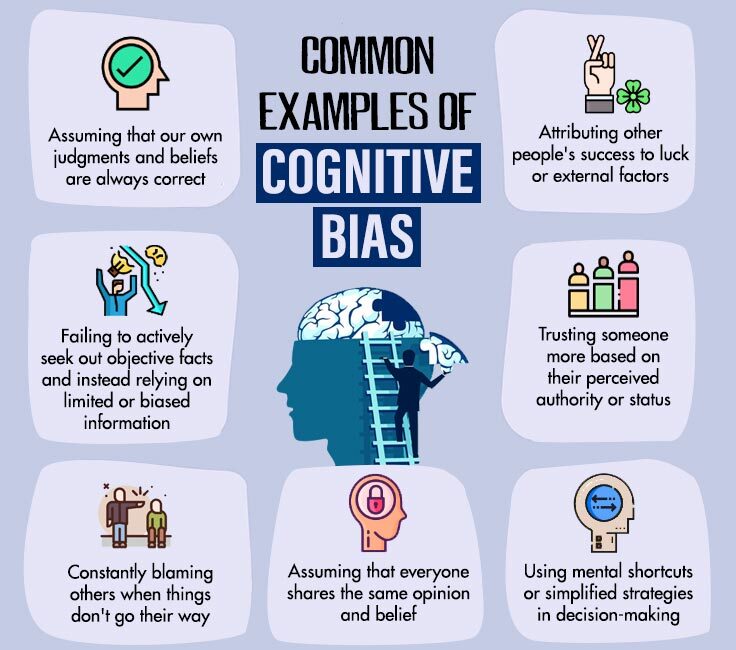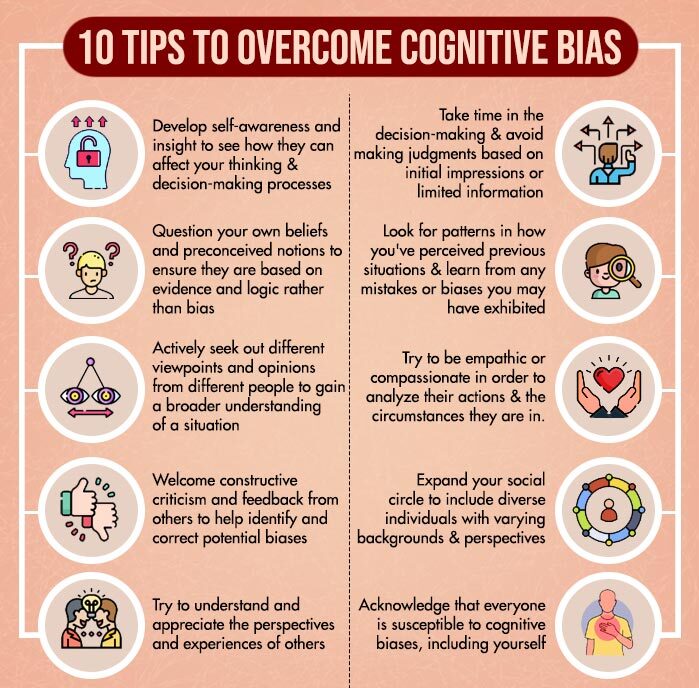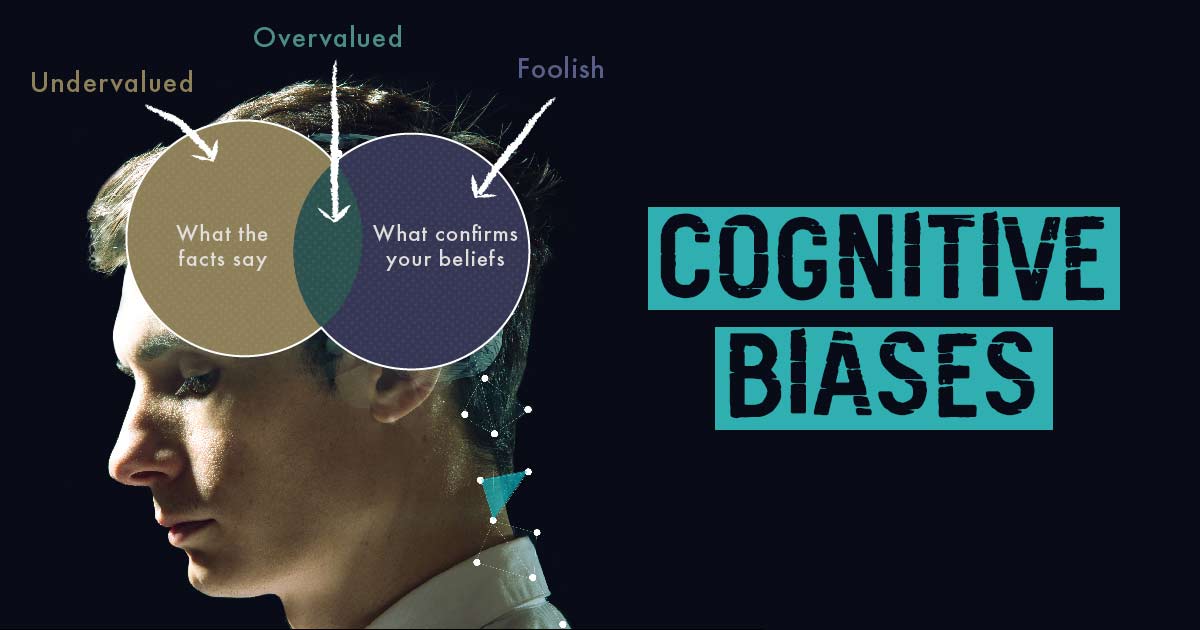A cognitive bias is a systematic pattern of deviation from rationality or objective thinking that influences our judgments and decisions. These biases can result in errors, distortions, and irrational behaviors, ultimately affecting our perception of reality and impacting our mental health and emotional well-being.
What is Cognitive Bias?
Cognitive bias refers to the 1 Douros G. (2021). The cognitive biases of cognitive biases. Emergency medicine Australasia : EMA, 33(2), 372–374. https://doi.org/10.1111/1742-6723.13723 systematic errors in our thinking and decision-making processes that can affect how we perceive and interpret information.
Our brains often employ shortcuts or heuristics to quickly process and make sense of the vast amount of information we encounter. While these shortcuts can be efficient, they can also introduce biases that lead to errors and distortions in our thinking.
Examples of cognitive bias can be 2 Korteling, J. E., Brouwer, A. M., & Toet, A. (2018). A Neural Network Framework for Cognitive Bias. Frontiers in psychology, 9, 1561. https://doi.org/10.3389/fpsyg.2018.01561 observed when someone consistently ignores or rejects different opinions, selectively looks for information that supports their own beliefs, and refuses to change their mind even when presented with evidence that contradicts their views.
Research has shown that adults tend to exhibit a greater negative cognitive bias compared to adolescents, and males may have a greater negative cognitive 3 Hodges, T. E., Lee, G. Y., Noh, S. H., & Galea, L. A. M. (2022). Sex and age differences in cognitive bias and neural activation in response to cognitive bias testing. Neurobiology of stress, 18, 100458. https://doi.org/10.1016/j.ynstr.2022.100458 bias than females, particularly during middle age.

Types of Cognitive Bias
Some common types 4 Friedman, H. H. (2017). Cognitive Biases that Interfere with Critical Thinking and Scientific Reasoning: A Course Module. SSRN Electronic Journal. https://doi.org/10.2139/ssrn.2958800 of cognitive bias are:
- Actor-observer bias- The tendency to attribute our own behavior to external factors while attributing others’ behavior to internal characteristics or traits. [Read More]
- Self-serving bias- The inclination to attribute positive outcomes to our own abilities or efforts, while attributing negative outcomes to external factors. [Read More]
- Confirmation bias- The tendency to interpret information that supports our existing beliefs. [Read More]
- Anchoring bias- Relying on initial information while making any decision, even if the information is arbitrary or irrelevant.
- Attentional bias- The selective focus on specific aspects of a situation or stimuli while ignoring other relevant information.
- Dunning-Kruger effect- People with little skill in a specific area overestimate their abilities, while those with high skills tend to underestimate their abilities. [Read More]
- Halo effect- The tendency to form an overall positive impression of a person based on a single characteristic, trait, or initial impression. [Read More]
Read More About Types Of Cognitive Biases Here
How Does Cognitive Bias Develop?
Some common causes 5 Friedman, H. H. (2017). Cognitive Biases that Interfere with Critical Thinking and Scientific Reasoning: A Course Module. SSRN Electronic Journal. https://doi.org/10.2139/ssrn.2958800 of bias include:
- Heuristics, when our 6 Gigerenzer, G., & Gaissmaier, W. (2011). Heuristic decision making. Annual review of psychology, 62, 451–482. https://doi.org/10.1146/annurev-psych-120709-145346 brains use mental shortcuts to process information quickly, we rely on simplified judgments without thoroughly considering all relevant factors.
- Emotional factors, such as fear, desire, or personal attachment, can have a profound impact on decision-making and often contribute to the signs of cognitive bias.
- Incomplete information, as our brains often fill in the gaps based on existing beliefs and we make assumptions or draw conclusions without sufficient evidence.
- Social factors, such as the opinions and beliefs of our social groups can influence our own thinking, leading to biases that align with the values of our community.
- Our cognitive processes have limitations, such as limited attention and information overload, which can contribute to biases by influencing our perceptions.
Impact of Cognitive Bias on Mental Health
Cognitive biases can significantly impact 7 Hallion, L. S., & Ruscio, A. M. (2011). A meta-analysis of the effect of cognitive bias modification on anxiety and depression. Psychological bulletin, 137(6), 940–958. https://doi.org/10.1037/a0024355 mental health functioning in various ways, such as:
- Distorted thinking which includes negative self-perception, self-criticism, and pessimistic outlook on life.
- Impaired decision-making, which can hinder our ability to make optimal decisions, resulting in choices and behaviors that may not be in our best interest.
- Limitations in problem-solving abilities by influencing the way information is processed and interpreted, make it harder to find effective solutions.
- Barriers to personal growth by distorting perceptions of oneself, limiting opportunities for learning, and impeding the exploration of new experiences.
- Increased the symptoms of anxiety, such as heightened worry, fear, and unease, amplifying negative thoughts and interpretations.
- Depression, such as feelings of hopelessness and sadness as bias can reinforce negative interpretations of self.
- Impact on relationships as cognitive biases can influence how information is interpreted in social interactions, leading to misunderstandings and conflict.
Read More About Anxiety Here
How to Overcome Cognitive Bias
To overcome cognitive bias, it is important to cultivate self-awareness and actively challenge our own thoughts and assumptions.
We can try to see things from different perspectives, carefully look at the facts, and be willing to change our beliefs if it makes sense. By using logical reasoning to change our biased thinking, we can develop more balanced and accurate thoughts.

Takeaway
Cognitive biases can significantly impact mental health by distorted thinking patterns, impairing decision-making, and exacerbating symptoms of depression and anxiety. Recognizing and addressing biases requires effort, but it is crucial to make fair and accurate decisions using logical reasoning to gain a deeper understanding of our own insights.
At A Glance
- A cognitive bias is a systematic pattern of deviation from rationality or objective thinking that influences our judgments and decisions.
- Different types of cognitive bias are actor-observer bias, confirmation bias, anchoring bias, etc.
- Causes of bias include heuristics, social influence, emotional factors, incomplete information, etc.
- Cognitive bias impact on mental health in various ways, such as distorted thinking, difficulty in decision-making, depression, and anxiety.
- Overcoming cognitive biases involves cultivating self-awareness, practicing critical thinking, and embracing open-mindedness.
Frequently Asked Questions (FAQs)
1. What is a conceptual bias?
A conceptual bias refers to a systematic tendency or inclination in thinking that influences the way individuals understand, interpret, and analyze information.
2. How do you identify cognitive bias?
Cognitive biases can be identified by recognizing patterns of thinking or decision-making that deviate from rational or logical processes.
3. Are cognitive biases genetic?
Cognitive biases are not solely genetic but are influenced by a combination of genetic factors, environmental influences, and individual experiences.















